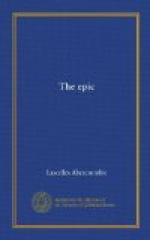FOOTNOTES:
[Footnote 6: ’And all round the ships echoed terribly to the shouting Achaians.’]
[Footnote 7:
’When in a dusty whirlwind thou
didst lie,
Thy valour lost, forgot thy
chivalry.’—OGILBY.
(The version leaves out megas megalosti.)
]
[Footnote 8: ’Mother, since thou didst bear me to be so short-lived, Olympian Zeus that thunders from on high should especially have bestowed honour on me.’]
[Footnote 9: ’Honour my son for me, for the swiftest doom of all is his.’]
[Footnote 10: “For everyone his own day is appointed; for all men the period of life is short and not to be recalled: but to spread glory by deeds, that is what valour can do.”]
[Footnote 11:
“They wer’ amid the shadows
by night in loneliness obscure
Walking forth i’ the void and vasty
dominyon of Ades;
As by an uncertain moonray secretly illumin’d
One goeth in the forest, when heav’n
is gloomily clouded,
And black night hath robb’d the
colours and beauty from all things.”
—ROBERT BRIDGES.
]
[Footnote 12: “All that is known, all that is felt, is God.”]
V.
AFTER MILTON
And after Milton, what is to happen? First, briefly, for a few instances of what has happened. We may leave out experiments in religious sentiment like Klopstock’s Messiah. We must leave out also poems which have something of the look of epic at first glance, but have nothing of the scope of epic intention; such as Scott’s longer poems. These might resemble the “lays” out of which some people imagine “authentic” epic to have been made. But the lays are not the epic. Scott’s poems have not the depth nor the definiteness of symbolic intention—what is sometimes called the epic unity—and this is what we can always discover in any poetry which gives us the peculiar experience we must associate with the word epic, if it is to have any precision of meaning. What applies to Scott, will apply still more to Byron’s poems; Byron is one of the greatest of modern poets, but that does not make him an epic poet. We must keep our minds on epic intention. Shelley’s Revolt of Islam has something of it, but too vaguely and too fantastically; the generality of human experience had little to do with this glittering poem. Keats’s Hyperion is wonderful; but it does not go far enough to let us form any judgment of it appropriate to the present purpose.[13] Our search will not take us far before we notice something very remarkable; poems which look superficially like epic turn out to have scarce anything of real epic intention; whereas epic intention is apt to appear in poems that do not look like epic at all. In fact, it seems as if epic manner and epic content were trying for a divorce. If this be so, the traditional epic manner will scarcely survive the separation. Epic content, however, may very well be looking out for a match with a new manner; though so far it does not seem to have found an altogether satisfactory partner.




